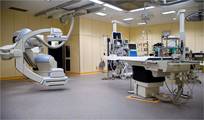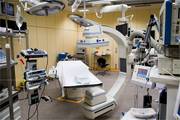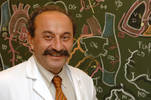Cardiosurgery
Information about the Centre
The Cardiosurgery Department treats a wide range of pathologies. We offer a broad range of top quality surgery, including full arterial revascularisations for coronary surgery (over 20 years' experience), systematic repair of aortic and mitral valves with degenerative disease (>95%), a full range of valve replacement techniques (ross, homograft, stentless etc.), a heart-transplant programme (primarily artificial hearts), paediatric and congenital surgery and endovascular unit for stent graft.
European first:
The Cardiosurgery Department is equipped with a cardiovascular hybrid operating theatre. It is the first time in Europe such a high-tech equipment is installed in an operating block. Read more (press release in French).
Procedures Performed
- Endovascular Treatment of Arterial Diseases
The treatment of the different aortic diseases such as aortic aneurysm, aortic dissection, traumatic rupture located on the thoracic or abdominal aorta often need an invasive open treatment by laparotomy and/or thoracotomy. The alternative treatment is to deploy an endograft by only a small grown incision.
Our Department is one of Belgium's leading units in the endovascular treatment of aortic disease. We started the endovascular programme in 1996 and have since treated more than 200 abdominal aortic aneurysms and 50 thoracic aortic diseases using the endovascular method. Our clinical results are excellent and comparable to the world medical literature.
For the occlusive disease of peripheral artery and carotid artery, we also initiated in 1996 the endovacular treatment of occlusive disease by iliac and femoro-popliteal angioplasty and/or stenting. More recently, we have conducted comparative studies on both open and endovascular carotid revascularisation. Importantly, all our carotid stenting are registered in the international multi-centric studies. We participated to both the ICSS protocol and ASCT protocols. Those registries are mandatory to allow in-depth analysis and discussion on the appropriate use of such innovative procedures in comparison to surgical gold standards.
- Percutaneous Aortic Valve Replacement
Aortic valve stenosis is the very common pathology in elderly patients. The conventional treatment is an open-heart surgery with replacement of the aortic valve using extracoporeal circulation and cardiac arrest. However according to the European Heart Registry, 32% of symptomatic aortic stenosis patients are not referred to surgery because of the risk of the operation due to the age and the different co-morbidities of the patients. For this reason, a new technique was developed in 2002, which consists on percutaneous aortic valve replacement under local anaesthesia without extra-corporal circulation. The valve is delivered at the right place through a catheter-based system.
Our Department was one of the first in Belgium to launch a trans-catheter valve-replacement programme (January 2008).
We have already performed either trans-femoral or trans-apical procedures in more than 20 patients with an excellent post-procedural results. Today, both general practitioners and cardiologists from all over the country refer many patients to our centre for endovalve treatment even though this procedure is still in its infancy, with an undisputable learning curve. Obviously, this still expensive technique requires a strict and objective evaluation before being made available to the whole community.
- Valve Surgery : Aortic, Mitral and Tricuspid Valve Reconstruction:
At the Brussels Saint-Luc University Hospital, more than 450 aortic valve repairs have been performed since 1996. The UCL Cardiovascular Department is a real pioneer in this particular field and a world leader in this type of surgery. We have performed over 100 mitral-valve repairs annually since 1992 (over 1,500 in total). Our expertise in this field is internationally recognised and we have developed specific techniques for neo-chordae implantation (oretex) which are now used worldwide.
For more that a decade, our department has provided post-graduate courses for both aortic valve replacement and mitral valve repair/replacement twice a year.
- Coronary Surgery : Minimally Invasive Coronary Bypass Surgery (CABG):
Since the launch of our Minimally Invasive Coronary Bypass Surgery programme in 2003, we have performed more than 100 surgical procedures.
This type of surgery is realised by video-thoracoscopy to harvest the left and right internal thoracic arteries. The anastomoses are performed through a small left anterior thoracotomy. We have recently analysed and published our experience with this innovative technique that show similar patency results in term of by-passes and shorter time to recovery.
We have also introduced the minimally invasive coronary surgery for second operation in selected patients in whom the gastro-epiploic artery is used to revascularise the right coronary artery with a small (10 cm) midline laparotomy.
- Coronary Surgery : Multi-arterial Coronary Bypass Surgery:
For more that two decades (since 1985), our group has been pioneering the multi-arterial coronary artery revascularisation technique which has now been recognised to promote long-term survival.
Several scientific works have been published by our surgeons and several international meetings on this topic have been organised. Currently, we perform more than 50% of all our revascularisation procedures using 2 or more arteries.
- Surgical Treatment for Heart Failure Patients:
Our artificial-heart programme was launched in 1992. In 1995 we were recognised as one of the European training centres for the implantation of the first-generation left ventricular assist device (LVAD) (Novacor).
Our department has followed the ongoing technological development in this high-tech field and is currently using LVAD of the second and third generation. Current and future indications for these devices are bridge to recovery, bridge to transplantation and finally long term or definitive placement for patients who are not eligible for transplantation.
The Medical Team
Gebrine El Khoury, MD, PhD, is recognised as a pioneer in aortic-valve repair.
He and his team run what has become a key centre in the treatment of valve disease; the centre is now considered a true authority on cardiac surgery, as illustrated by its many daily vistors, its active involvement in high-level international conferences (live surgery, lectures, postgraduate courses, etc.) and the organisation of three international meetings each year.
Contact Details
Cliniques Universitaires Saint-Luc (UCL)
Avenue Hippocrate, 10
1200 Bruxelles
Cardiovascular and Thoracic Department
Website : www.valvesymposium.org



